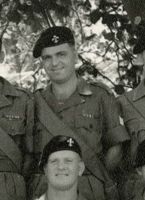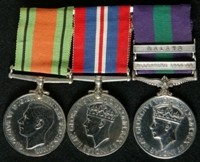
Photograph of Kenneth in Tameside Local Studies and Archives Centre. Reference: MRP/7B/143

(L to R) 1939-45 Defence Medal; 1939-45 War Medal; General Service Medal 1918-62 with clasps 'Palestine 1945-48', 'Malaya'
Kenneth was born on the 1st April 1926 in Openshaw, Manchester. His father was called George William and he had a brother named Terence Stuart. They were members of the Church of England. We don't know anything else about Kenneth's early life or family.
The Second World War broke out in September 1939. Kenneth was too young to be conscripted into the Army, but he was a member of the Army Cadet Force from 1942. After leaving school Kenneth became an apprentice electrician. Kenneth joined the Army on the 29th January 1945. Like all new recruits during the Second World War he was assigned to the General Service Corps for 6 weeks of basic training and assessment. After this he would be assigned to a unit based on his performance. He was given the service number 14459048.
When he enlisted Kenneth was 5 feet 9 inches tall and weighed 144 pounds. He had a 'fresh' complexion, brown eyes and dark brown hair. His father lived at 69 Fairfield Road in Higher Openshaw at the time.
On the 15th March Kenneth was assigned to the 15th Primary Training Centre. After his basic training he joined the Manchester Regiment on the 26th April. We don't know where this took place. Kenneth remained in the UK for the rest of the war, and did not go abroad until the 17th November 1945, when he was sent to Malta. The 5th Battalion of the Manchester Regiment was sent to the island on this date so it is very likely that Kenneth was serving with them. Their Commanding Officer was Patrick King-Farlow, whose medals are also in the Museum of the Manchester Regiment collection.
After just over a year Kenneth returned to the UK. He was assigned to the 24th Machine Gun Training Centre in Chester on the 15th December 1946, but only served with them for 2 months before being sent to the Middle East and transferred to the 2nd Battalion of the Cheshire Regiment.
Although Kenneth had not seen active service during the Second World War, he would now. The 2nd Battalion was sent to Palestine to try to deal with militant groups of Jewish settlers. They were determined to ensure a Jewish homeland was created in the British territory of Palestine, and attacked both the British forces and the Arab population in an attempt to drive them out.
Kenneth left Palestine on the 8th October, shortly before the violence there increased and developed into a civil war between the Jewish and Arab populations. He returned to the UK and served there until March 1950. He was stationed at the Mercian Brigade Training Centre at Lichfield in Staffordshire. This trained recruits for the Cheshire Regiment, the Worcestershire Regiment, the North Staffordshire Regiment and the South Staffordshire Regiment.
Kenneth had been promoted to Lance Corporal on the 5th September 1947, shortly before he left Palestine, and he became an Acting Corporal on the 1st April 1948. He was confirmed in the rank on the 28th September. Between the 22nd August and the 15th October 1949 he went on a Platoon Weapons Course at the School of Infantry in Warminster, Wiltshire.
On the 15th February 1950 Kenneth was transferred to the Lancastrian Brigade Training Centre at Preston, Lancashire. This allowed him to rejoin the Manchester Regiment and become a member of the 1st Battalion. He arrived in West Germany on the 6th March and moved with them to Berlin during April.
Later that year Kenneth found himself in trouble. On the 28th October he had been 'riding in an overloaded War Department Jeep on an unauthorised journey'. The jeep was 'involved in an accident causing damage'. His case was heard on the 10th November by the Commanding Officer. Kenneth was 'Severely Reprimanded' and ordered to pay £2 towards the repairs. This didn't affect his enthusiasm for the Army though; he extended his service from 7 to 12 years on the 28th January 1951.
On the 6th February Kenneth obtained the 3rd Class Army Certificate of Education. He then obtained the 2nd Class Certificate on the 22nd. Later that month he returned to the UK for a period of leave before he sailed with the 1st Battalion to Malaya and active service.
A Communist insurgency had been raging in the British colony of Malaya since 1948. The 1st Battalion was to join a large number of British soldiers in attempting to bring it under control. They took part in patrols of the jungle and guarded the civilian population in an attempt to restrict the supplies and the freedom of movement available to the insurgents.
We don't know much about Kenneth's job during the early part of his time in Malaya. He was promoted to Acting Sergeant during October 1952. This rank meant that he could serve as a Platoon Sergeant, who advised a Second Lieutenant on how to command his platoon of around 30 soldiers. If there was a shortage of officers a Platoon Sergeant could also command a platoon, and this is what Kenneth did during mid 1953. He led 10 Platoon of D Company for a period during a reorganisation of the 1st Battalion that left them with 'very much reduced numbers'. Despite this shortage of men they still 'kept up our patrolling and ambushing, but...we have not had a single contact' (encounter with the insurgents). We don't know how long he kept this job.
Kenneth stayed in Malaya with the 1st Battalion until they returned to the UK in May 1954. He had volunteered to extend his tour by 6 months during December 1953. After 3 months in the UK the 1st Battalion returned to Berlin that August.
In early May 1955 Kenneth travelled to the British base at Sennelager in North Rhine - Westphalia. He took a course that taught him to be a Clerk, and passed the Trade Test on the 6th. Clerks dealt with the administration and paperwork created and received by the battalion. He extended his service to 22 years on the 23rd April 1956. He served as Company Quartermaster Sergeant to Support Company during late 1956 and early 1957.
The 1st Battalion returned to the UK on the 27th June 1957. Kenneth left them later that year to take up a post at the School of Infantry in Warminster. We don't know what job he held, but we believe the posting lasted until October 1958.
When he left the School of Infantry Kenneth returned to a very different unit. The Manchester Regiment and the King's Regiment (Liverpool) had amalgamated into The King's Regiment (Manchester and Liverpool) on the 1st September 1958. Kenneth spent very little time with them though; he was posted to the Regimental Depot of the Border Regiment on the 1st November, then their 1st Battalion on the 13th January 1959. After just a month Kenneth moved again, he was sent to the Lancastrian Brigade Depot in Preston on the 14th February.
Kenneth's next job would be in very different surroundings. On the 2nd July he travelled to Libya and joined the Headquarters Tripolitania Area. Britain had an agreement to base units in Libya (2 infantry battalions and an armoured regiment in 1960), but many others made use of the large training areas. For example in March 1960 4,000 men and over 400 vehicles were flown into the country to take part in a large training exercise. The Headquarters will have planned exercises such as this, and coordinated with the Libyan authorities to make sure they ran smoothly.
Unfortunately we don't know what Kenneth's job in Libya actually was. He left the country on the 15th October 1961 and returned to the Lancastrian Brigade Depot. He was promoted to Staff Sergeant on the same day and rejoined the 1st Battalion of the King's Regiment on the 30th January 1962.
Six months later Kenneth requested to revert to the rank of Sergeant. This was granted and he held this rank when the 1st Battalion moved to Berlin in July 1962. Again we don't know his job.
At around this time Kenneth was assessed as being a 'satisfactory' sergeant. His Commanding Officer felt that although he had 'a wide knowledge of specialised infantry duties, his placid nature and lack of drive do not stand him in good stead. He would do well in an administrative appointment'.
On the 2nd October 1962 Kenneth left the 1st Battalion for the last time. He was sent to Hadrian's Camp in Carlisle, Cumbria to join the Army Apprentice's School. This trained new soldiers in technical trades such as electrician, mechanic and surveyor. Kenneth was based there until the end of his service. He spent several years as a member of the Regimental Police there. This involved maintaining discipline within the School. Importantly, he was able to form 'an excellent liaison with the civil police' responsible for the surrounding area. However he was not a 'Redcap' or Military Policeman.
Whilst he was stationed in Carlisle Kenneth obtained his 1st Class Army Certificate of Education, on the 22nd March 1963.
Kenneth left the Army on the 13th March 1967, after 22 years and 44 days service. He went to live at Flat 15 in Halstead House on Bishopswood Road in Basingstoke, Hampshire. He served as a police officer for a time, but we don't know which force he was a member of.
By 1986 Kenneth had returned to Manchester. He lived at Flat 3, 59 High Lane in Chorlton. He died in Withington Hospital on the 24th November 1986 after suffering a stroke. He was 60 years old.
We don't know whether Kenneth had married or had children. Terence was with him when he died. His medals were donated to the Museum of the Manchester Regiment during 1987.




